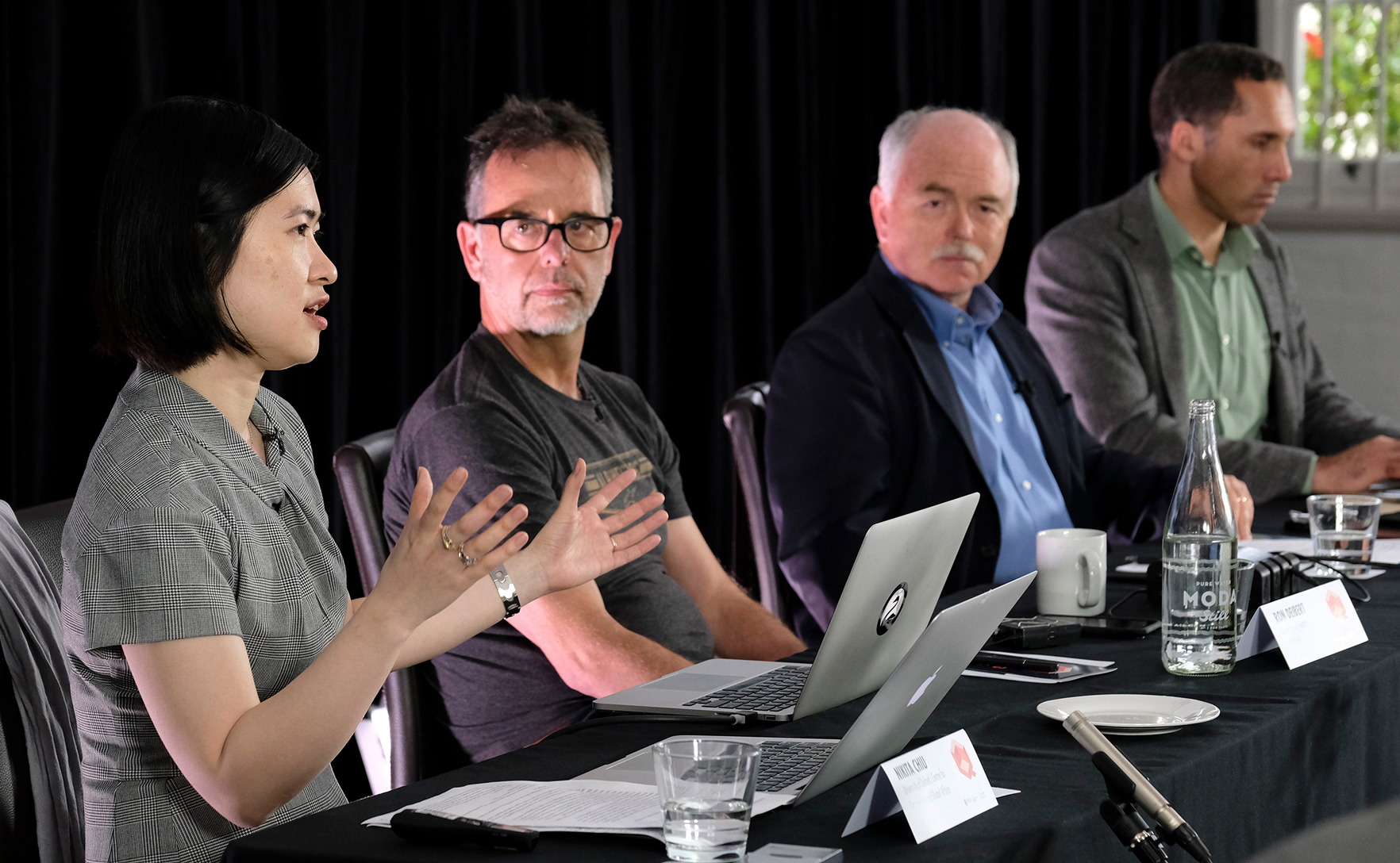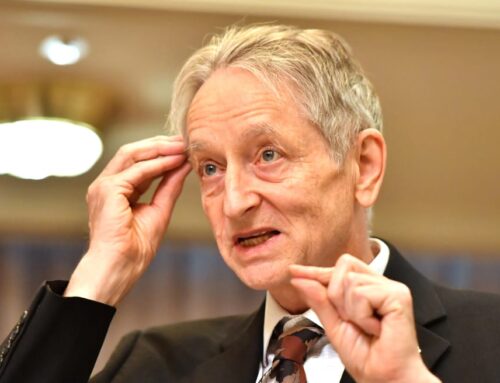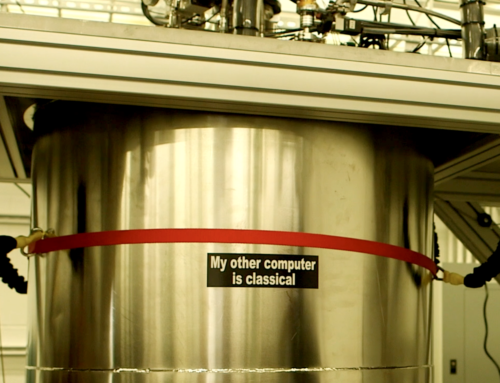Susannah Lai
The second panel of the day investigated the parallels between the ‘quantum race’ and other technological races, in particular the nuclear race, a likely driver of the caution and fear incited around ‘quantum race’. Considering the topic, the composition of the panel tended towards political scientists, featuring Dr Frank Smith as Chair, Professor Ron Diebert, Dr Nikita Chiu and Dr Wade Huntley.
Dr Smith introduced the panel, a little ironically, by warning that calling things ‘parallels’ without close regard to context can be dangerous, as things do not often happen in the ‘cognitive lumps and clumps’ that tend to be assumed when discussing parallels. In the context of the ‘quantum race’, there is a definite tendency to compare elements to the nuclear race, which although sometimes useful, often fails to take into account the fundamental differences in the technology and the field that it affects.
He also pointed out that there is a tendency for technology to be over-hyped, with discourse centering around a possible technological singularity, an ‘extravagant conception’ of what the technology involves. Still, these are interesting matters to consider, Dr Smith acknowledged.
The first speaker introduced was Dr Nikita Chiu of the University of Cambridge’s Centre for the Study of Existential Risk. She focused on the split that often occurs during the development of technologies, with different departments focusing on different aspects, compartmentalizing their research. However, Dr Chiu said, there is value in collaboration and synergy, mentioning that while there are many problems with the world, and it seems hard to prioritize because most of them are inherently connected and fixing one would help with fixing others.
Dr Chiu’s research focuses mainly on issues concerning space-faring technology, particularly the international relations aspects, such as weapons in space and dealing with the launch and decommissioning of satellites. She pointed out that there are, in fact, many treaties addressing the use of nuclear weapons in space, which are all important and took a great deal of care and time to negotiate. Considering this, it would be prudent to start working out the possible treaties that would be needed to make quantum technology safe. However, it is important not to disregard one issue in favour of another. Dr Chiu brought up the example of regulating satellites, mentioning that there are now many private interests that are encroaching on operations that were previously the sole province of the State, such as the launch of satellites.
There is considerable effort put into the tracking of satellites and the smaller satellites that are typically launched by private interests pose several issues. Primarily, these smaller satellites are prone to falling apart and creating rubble. This is a serious issue in space, as that rubble does not ‘rot’ away or become otherwise innocuous like it might on Earth. Satellite rubble instead remains in orbit, moving at high velocity with the potential to cause serious damage on impact with other space-orbiting objects. Additionally, these satellites often do not carry extra fuel on board, meaning that if they have issues they are unable to recover.
Considering the parallels to the ‘space race’, Dr Chiu said, ideally quantum would be able to progress along the lines of projects like CERN, which are highly collaborative. However, she noted that the window of opportunity may have already closed, considering the framing of quantum development as a ‘race’. Otherwise, a good outcome would be to have collaboration along the lines of the International Space Station, where different modules made by various countries are able to ‘fit’ together, and astronauts are trained in the operation of all modules. In the end, she said, collaboration is the material point, whatever form it may take.
Professor Ron Diebert of CitizenLab spoke next, explaining the vital work that CitizenLab does in the area of cybersecurity and exposing the extent of State sponsored surveillance and other hacking. He went on to reveal that within the ‘Five Eyes’ network, an organization that involves intelligence organizations in Australia, Canada, New Zealand, the UK and the USA, ‘quantum’ refers to something quite different from ‘quantum technology’ as it is generally understood. ‘Quantum’ in that context refers to a process that involves injecting malware into unsecured, typically http, connections.
Often these systems are aimed at political dissidents, as demonstrated by CitizenLab research which found an Israeli company using three zero-day exploits in Apple phones to hack into specific individuals’ phone. A more disturbing example, in light of recent events, was when, in the course of looking into various commercial spyware and other strange activity, CitizenLab came across a case of spying on a Saudi political dissident living in Canada. This person was a friend of Jamal Khashoggi, and considering his brutal murder, the incident is cast in a particularly morbid light. CitizenLab itself has also been the target of espionage activities, although they have been able to catch these attempts and minimize damage. Quantum, mused Professor Diebert, promises great advances in the area of cybersecurity but carries just as much risk.
The last speaker on this panel was Dr Wade Huntley, of the Naval Postgraduate School’s Department of National Security Affairs, specializing in cybersecurity and nuclear proliferation. Addressing the potential of quantum technology, he commented that disruptive technologies are often more interesting for their potential rather than direct results. Similarly, seeing what a technology does and is capable of might matter more than who wins the ‘race’.
Moving to discuss the parallels with other ‘races’, Dr Huntley spoke on the nature of the ‘nuclear race’, observing that while it had started in a similar manner to other conventional arms races, it had diverged rather quickly in its development. Considering the sheer destructive power involved, demonstrations of power were publicized via ‘tests’ rather than actual deployment, and ultimately, the participants tried to de-arm. Notably, the nuclear race and nuclear technology, he said, had not delivered on their peaceful promises, as all development in those areas were to a greater or lesser degree masks for military interests, even now. The dominant reaction to the nuclear age was fear, Dr Huntley commented, and all private or commercial development lagged behind the State.
The ‘space race’, too differs from the ‘quantum race’. While the start was a bitter competition, the race was fundamentally self-limiting, especially regarding the exponentially increasing costs with each goal achieved. As such, the technology eventually became collaborative, and without a pressing need to invest for reasons of national security and the changing economic landscape, private investment and development eventually overtook state involvement. Furthermore, the collaborative, international nature of the effort has allowed for smaller countries to make contributions to development by working on partial systems intended to fit together to make a larger piece. Ultimately, the space race ran against technological goals, and not other powers.
Dr Huntley next mentioned cybersecurity as another ‘race’, saying that this time, the lines of development more closely followed that of conventional technological races. Cybersecurity in general is heavily framed in terms of the offence-defense balance and it is considered to be heavily biased toward offence, at least currently. Curiously, he said, this race is also often framed as ‘non-violent’ and rather than being a race solely to advance military interests, it is perceived as ‘ethically required’. However, he asserts, this is still fundamentally a competitive race, and as such, it carries an implicit violence.
Ultimately, however, this discussion was aimed at understanding the potential future for the ‘quantum’ race. On this point, Dr Huntley mused that since most ideas about the likely developments set to occur are incoherent, it is very difficult to tell where development will go, and therefore anticipating the form that the race will take is all but impossible.
After this the floor opened to questions, which mostly focused on possible policy implications. One addressed the possibility of an actor achieving quantum supremacy and not telling the rest of the world. The opinion of the panel was that the nature of the social actors and their research makes it more likely that this news would be made public and would be difficult to keep secret. Other questions involved how policy would be set; if the US would set the example for other jurisdictions, or if the further development of technology combined with certain policy decisions would end up amplifying corporate power and surveillance. In response, Professor Diebert again stressed the need for adversarial research in the area. Similarly, the reply to a question about the national security and power-balance implications was met by comments that it is more useful to understand the effects of these shifts, and whether they will be overall positive or negative for the world.






Leave a Reply